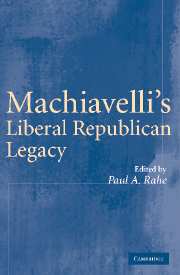Book contents
- Frontmatter
- Contents
- List of Contributors
- Acknowledgments
- Abbreviations and Brief Titles
- Introduction: Machiavelli's Liberal Republican Legacy
- Prologue: Machiavelli's Rapacious Republicanism
- PART I THE ENGLISH COMMONWEALTHMEN
- PART II THE MODERATE ENLIGHTENMENT
- 4 Getting Our Bearings: Machiavelli and Hume
- 5 The Machiavellian Spirit of Montesquieu's Liberal Republic
- 6 Benjamin Franklin's “Machiavellian” Civic Virtue
- PART III THE AMERICAN FOUNDING
- Index
5 - The Machiavellian Spirit of Montesquieu's Liberal Republic
Published online by Cambridge University Press: 24 July 2009
- Frontmatter
- Contents
- List of Contributors
- Acknowledgments
- Abbreviations and Brief Titles
- Introduction: Machiavelli's Liberal Republican Legacy
- Prologue: Machiavelli's Rapacious Republicanism
- PART I THE ENGLISH COMMONWEALTHMEN
- PART II THE MODERATE ENLIGHTENMENT
- 4 Getting Our Bearings: Machiavelli and Hume
- 5 The Machiavellian Spirit of Montesquieu's Liberal Republic
- 6 Benjamin Franklin's “Machiavellian” Civic Virtue
- PART III THE AMERICAN FOUNDING
- Index
Summary
It is now less controversial than it once was to claim that Machiavelli is a significant presence in Montesquieu's political philosophy. This change stems, Montesquieu might say, from two causes. The more elementary is the “influence scholarship” of the past century, which, after studying Montesquieu's library, the style and themes in his published works, and his comments in letters and notes, concludes that he was substantially indebted to Machiavelli. For example, by 1726 – some eight years before publication of his Considerations on the Causes of the Greatness of the Romans and Their Decline and some twenty-two years before publishing his masterwork, On the Spirit of Laws – Montesquieu owned The Prince and the Discourses on Livy in Latin and French; eventually he came to possess the works of Machiavelli in Italian as well. However, the narrow methods of such scholarship tend to obscure the extraordinary character of each philosopher's thought and the dialogue a philosopher might have with a predecessor. Montesquieu himself boasts of having examined a sheep's tongue under a microscope (EL 2.14.2), but it is another matter to apply these methods to philosophic works such as Machiavelli's Discourses on Livy and Montesquieu's Considerations on the Romans.
The methods and spirit of influence scholarship point to the more interesting cause for lessened controversy over linking these philosophers: that being associated with Machiavelli is no longer scandalous.
- Type
- Chapter
- Information
- Machiavelli's Liberal Republican Legacy , pp. 121 - 142Publisher: Cambridge University PressPrint publication year: 2005
- 1
- Cited by



